October 2019: Olive Tree

Volume IV/Issue 7/October 2019


From The Editorial Desk
The Rosary: Prayer of Power and Consequence
By Stephanie Engelman
The Rosary has a long and rich history. While it’s origins are often disputed, one thing those who pray the Rosary can agree with is this: it is a prayer of great power and consequence. From turning the winds to bring about victory in battle, to turning a satanist into a saint, this prayer of Our Lady has proven its importance, and been witnessed to by countless popes.
The Battle of Lepanto
In 1571, the Ottomans were on a mission to conquer Christian lands, but there was one city the Turkish sultan wanted more than any other – the Holy City of Rome. He dreamt of turning St. Peter’s Basilica into a mosque, just as they had done with the Hagia Sophia. One battle stood between the sultan and the Christian east.
Knowing the magnitude of what was at stake, Pope Pius V ordered churches throughout Italy opened, and instructed the faithful to take up their rosaries. Aboard the ships of the Holy League, priests heard confessions and offered Masses on every boat the night before battle, and the Pope gave a plenary indulgence to every member of the Holy League army. Commander Don John unchained the prisoners who were rowing belowdecks and gave them all weapons, promising their freedom if they fought bravely. More importantly, he gave every man the most powerful weapon of all: a rosary. The men spent most of the night in prayer, joining together in one final prayer before the battle began.
Shortly after the battle began, the wind shifted 180 degrees. The sails of the Holy League were filled, while the Ottoman’s, suddenly sailing against the wind, were forced to take down their sails and resort to rowing, a task carried out by Christian slaves beaten by whips below decks.
Against all odds, the Christians won the battle. Of the 300 Turkish vessels that entered into the battle, only 13 remained, and more than 30,000 Turks were slain. The Christian west was saved, and – though it wouldn’t be the last battle fought – it was the seminal moment that turned the tide in protecting Christianity in Europe and beyond. Attributing the victory to the work of Our Lady, through the Rosary, Pope Pius declared a day of celebration. Ultimately, this day would come to be celebrated on October 7th as the Feast of the Holy Rosary.
Conversion of Sinners
The Rosary provides in spiritual conflict as well. Bartolo Longo was the son of wealthy and devout Catholic parents, both of whom prayed the Rosary every day. In the late 1800s a young and disillusioned Bartolo, having lost his beloved mother, was studying law at the University of Naples. Through the influence of acquaintances, Bartolo began dabbling in the occult and pagan rituals. He was eventually “ordained” a satanic priest, after which he focused on undermining the Catholic Church and ridiculing all things Christian. His demonic obsession (slightly different than possession), began to cause declining physical health, extreme depression, paranoia, and eventually a mental breakdown. After hitting bottom, he heard his deceased father’s voice telling him: Return to God!
A friend of Bartolo’s put him in touch with a Dominican priest who heard his confession and received him back into the Church. Shortly afterward, Bartolo experienced a mystical locution, during which he heard the priest repeating these words to him: “If you seek salvation, promulgate the Rosary.” He was so moved that he dedicated his life to spreading devotion to the Rosary. He eventually became a Third Order Franciscan, taking the name Brother Rosario. Today, the basilica he built in Pompeii still welcomes millions of pilgrims a year to see the church built by a former satanist who dedicated the rest of his life to sharing the truth of the faith through the Rosary. Having been beatified in 1980, Bartolo is now “Blessed Bartolo,” proving that the Rosary can save souls as well as win battles.
The Devotion of Popes
Countless popes have been significantly influenced by the Rosary, and held strong devotion to the prayer. Both Pope Pius V and Pope Leo XIII have been called the “Pope of the Rosary,”
In these times, when violence stretches its fingers into our concerts, our schools, and our churches, let us remember the power of the Rosary. It is a power that doesn’t rest in beads laying dormant on our coffee tables, but in prayers that issue from our hearts as we supplicate:
Our Lady of the Holy Rosary, Queen of Peace, pray for us.
This article was taken from the web site: tektonministries.org and edited for the Olive Tree. We are not affiliated with, and do not necessarily condone or endorse all that is on their web site.

Patience

"In your patience you shall possess your souls." (Luke 21:19)According to the dictionary patience is, "the capacity to accept or tolerate delay, trouble, or suffering without getting angry or upset." Let us consider how important patience is to us as Christians. In Saint Matthew's Gospel we read of the man, who owed ten thousand talents. According to the Douay in a footnote, a talent is 750 ounces of silver. And so this is a debt of well over a million dollars. The king desired the servant to repay the debt: "But that servant falling down, besought him, saying: Have patience with me, and I will pay thee all." (Matthew 18:26) As we continue reading, the servant, who had just been forgiven over a million dollar debt, approaches a fellow servant, who owed him a hundred pence, which is about two hundred dollars. "But that servant falling down, besought him, saying: Have patience with me, and I will pay thee all." (Matthew 18:29) Jesus told this parable to show us how patient God is with us, God being represented by the king, Who we owe more than we can ever repay, and we are represented by the servant. Let us consider Jesus' patience in His passion. How many of us would bear as well under one percent of that suffering?
Saint Cyprian outlines the many benefits of patience in preventing us from sinning, including, setting rules of self-control. Let us consider the control we need in order to live a virtuous life. Consider a young couple preparing for marriage. Patience helps them abstain from marital pleasures until after marriage, whereas impatience leads to sin. If we look at many of our sins, don't we find impatience lies just below the surface of them?
Saint Gregory the Great tells us that patience is at the root of all virtues. We can conclude that impatience is at the root of many, if not all sins.
There is a prayer someone made up about patience: "Lord, give me patience and give it to me now!" However patience is the ability to tolerate delay without getting angry. Another prayed: "Lord, give me patience. You already are giving me the opportunities to be patient, but I need the actual patience." Indeed, we should pray for patience. We should know that virtues are exercised by being tried. For instance, Saint Augustine says that we cannot know how attached worldly things, until they are taken away from us. Our reaction under this trial shows where our heart truly is, as Scripture says: "For where thy treasure is, there is thy heart also." (Matthew 6:21)
"He that shall lead into captivity shall go into captivity: he that shall kill by the sword must be killed by the sword. Here is the patience and the faith of the saints." (Apocalypse 13:10) This is right after a discussion of the first beast of Apocalypse, the Antichrist and before the second beast, who follows. And let us go to the next chapter: "Here is the patience of the saints, who keep the commandments of God and the faith of Jesus." (Apocalypse 14:12) Of patience the Venerable Bede says: "Although the beast has vented his rage, yet the saints are not made sad by the temporal suffering which is to be rewarded by eternal bliss. For they see, on the other hand, that their persecutors, who for a time act proudly, suffer eternal punishments with the beast."
Some think we are in Apocalypse times and Antichrist may soon arrive. Saint James says: "Be patient therefore, brethren, until the coming of the Lord." (James 5:7) Saint Paul says that the Man of Sin, the Antichrist shall be slain by the brightness of the coming of the Lord. (II Thessalonians 2:8) Whether we are in Apocalyptic times or not, we should be patient.
Let us return to Bede's comment that the Saints that have just suffered the persecution of Antichrist, which many think will be the worst persecution of the Church in history, are not made sad. Proverbs (12:21) tells us: "Whatsoever shall befall the just man. it shall not make him sad:" The patient are also just, because being just with others requires patience on many occasions. If we are sad, then we should look to see where we are being unjust. We will also notice that we are being impatient somewhere. Where we find impatience in our lives, we will also find sins we need to deal with. Impatience is to sin similar to a fever to an illness. It is a symptom of an underlying problem. Like the fever it is a warning sign, in this case of a far more serious disease, a spiritual disease.
Saint Gregory states: "all the saints have been martyrs either by the sword or of patience; so that, we can be martyrs without the sword, if we keep patience." Let us consider the martyrdom of living a long life, which will be full of tribulations. Saint Paul tells us: "For whom the Lord loveth, he chastiseth; and he scourgeth every son whom he receiveth." Without work there is no reward. And we earn heavenly bliss, by accepting God's will, especially when it goes contrary to our own.
Why are we all called to be martyrs? Saint Thomas Aquinas tells us that martyrdom is to suffer death in defense of virtue. We are all called to be virtuous, therefore we are called to a form of martyrdom. Saint Paul says: "I die daily, I protest by your glory, brethren, which I have in Christ Jesus our Lord." (I Corinthians 15:31) We must be dead to self to live patiently for Jesus Christ. Impatience is a symptom of not being totally dead to self, which as Saint Paul tells us, we must do every day. Jesus gives us the example of patience in the Garden of Gethsemane. "Father, if thou wilt, remove this chalice from me: but yet not my will, but thine be done." (Luke 22:42) Consider His patience in what happened after this prayer. Consider the patience of Mary, the queen of martyrs. True, she did not suffer bloody martyrdom, but as we saw, was a martyr of supreme patience.
Let us remember: "In your patience you shall possess your souls." (Luke 21:19)
Herein Is Love
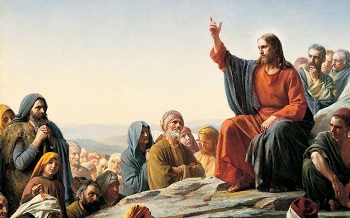
"Thou shalt love the Lord Thy God with all thy heart, and with all thy soul, and with all thy mind." (St. Matthew 22:37)
In the Twenty-Second Chapter from St. Matthew's Gospel, we hear that the Pharisees had heard that Our Lord had put their "arch-enemies," the Sadducee's to silence and they saw this as their opportunity to put Our Lord in His place. Now, they probably should have known better but they took their chances and sent out a lawyer which, St. Matthew reminds us was "tempting Him" and asked: "Master, which is the great commandment in the Law?" Now, this lawyer might not have been the sharpest knife in the bunch because it seems to me if he was trying to trip up Our Blessed Saviour, it seems as though he would have picked a tougher question than this. You see, any devout Jew would have known the answer to this question, let alone a learned Rabbi such as Our Lord. And, so Our Lord responds very easily: "Thou shalt love the Lord Thy God with all thy heart, and with all thy soul, and with all they mind." (St. Matthew 22:37.)
Now for us listening today to these words, they can be a bit overwhelming, can't they? I mean when we hear the words: . . . . with all thy heart, with all thy soul and with all thy mind . . . . especially if we emphasize the word "all" . . . it can be a bit overwhelming especially to those of us who lead busy lives. If you are anything like me, you are constantly doing things and going from one place to the next. So, your day, your week, your month is broken up into "pieces." In other words a piece of your day goes to work; another piece goes to doing things at home; another piece goes to relaxation; another piece goes to shopping; another piece goes to running errands; etc. And in between running errands and relaxation and going to work, etc., if you have some spare time in between you give this "piece" to God.
Now, there is no way getting around being busy. All of the things I just mentioned are very important in their own right and need to be done, but the key is to somehow involve God in each one of our tasks, whether it be going to work, or doing chores, or fixing up the house, or going shopping, etc. If we find a way to involve God in each one of our tasks on a daily basis, it is at that point that we can truly say that we love God "with all of our heart, all of our mind, and with all of our soul."
Now, interestingly enough, recently, (September 29th to be exact), is also the Feast of St. Michael and All Angels or as sometimes referred to as Michaelmas. Now, you know what St. Michael the Archangel was known for, don't you? He was the Prince of the Heavenly Host and he had a fierce battle with Satan and kicked Satan out of Heaven:
"And there was a war in Heaven: Michael and his angels fought against the dragon; and the dragon fought and his angels. And the great dragon was cast out, that old serpent, called the devil, and Satan, which deceiveth the whole world: he was cast out into the earth, and his angels were cast out with him." (Revelation 12:7-9)
Now the reason why there was a battle resulting in Satan and his angels being thrown out of Heaven is because, quite frankly, Satan got a little bit too big for his britches. In other words, even though he was an angel, and was supposed to be in service of Almighty God, he decided that he didn't want to be in service of God any longer. He wanted to do things his way and not God's way.
"How art thou fallen from Heaven, O Lucifer, son of the morning! How art thou cut down to the ground, which didst weaken the nations! For thou hast said in thine heart, I will ascend into Heaven, I will exalt my throne above the stars of God: I will ascend above the heights of the clouds; I will be like the Most High." (Isaiah 14:12-15)
As you can see, the problem with that old serpent Lucifer was that he got to be too good for God. In other words, he was too big for God and did not need God any longer. He thought he was so good and so mighty and so powerful that he did not need God any longer. He was in Heaven but Heaven was not enough for him, he wanted more than Heaven.
In a strange sort of way, this story reminds me of another episode also heard about in the Old Testament. Go back to the Book of Genesis. We hear the following conversation between that old serpent and Eve in the Garden of Eden:
"For God doth know that in the day ye eat thereof, then your eyes shall be opened, and ye shall be as gods, knowing good and evil. And when the woman saw that the tree was good for food, and that it was pleasant to the eyes, and a tree to be desired to make one wise, she took fo the fruit thereof and did eat." (Genesis 3:5-6)
Now, we know the rest of the story: Eve got her husband Adam to eat of the apple as well . . . . because we know that all husbands do exactly as they are told . . . and both Adam and Eve did something that they should not have done. They knew that they should not have done it because God told them not to. But despite the fact that they were in Paradise, paradise was not good enough for them. They wanted more than paradise. They wanted it all. They wanted paradise plus more just like Heaven wasn't good enough for Satan. He wanted Heaven plus more.
As Christians, we are called to acknowledge the fact that we are in need of God. As Christians, we are called to acknowledge the fact that we are not perfect, that we are fallen, that we are in need of the Messiah. Lucifer, and also Adam and Eve, decided that they did not need God. They could do things on their own, and in their minds, better than God since they didn't need to rely on God. We, on the other hand, acknowledge that everything we have is a gift from God.
"For the wages of sin is death; but the gift of God is eternal life through Jesus Christ Our Lord." (Romans 6:23). God gives the gift of Christ to us on a daily basis. God gives of Himself to us especially in the Blessed Sacrament so that He can nourish us, fortify us, and strengthen us for the journey of life.
"Herein is love, not that we loved God, but that He loved us, and sent His Son to be the propitiation for our sins." (1 St. John 4:10) God loved us before we were even born. God has loved us every day that we have been alive. Whether we are 30 or 70 or 90 years old, no matter what our age, God has thought about us every single day our entire life. Can we say the same thing about God, though? Have we thought about Him every day? God has given the gift of His Son to you. Give God the gift of your love and devotion to Him."

The Funny Pharmacy
A joyful mind maketh age flourishing: a sorrowful spirit drieth up the bones. - Proverbs 17:22

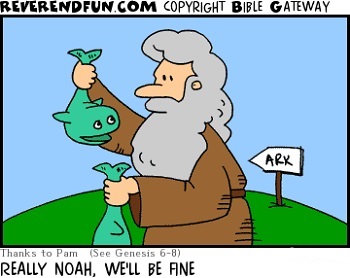
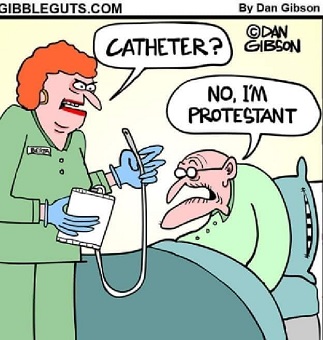




Those who knew and opposed John XXIII, but did not publicly accuse him of heresy, were they also culpable, and lost their authority as well?
This would also be true, if they did not fully expose the problem.

The Pope Speaks: October 2019
Duty of Catholics to Their Fellow Catholics and the Church

"The faithful, and more precisely the laity are stationed in the front ranks of the life of the Church, and through them the Church is the living principle of society. Consequently, they must have an ever clearer consciousness, not only of belonging to the Church, but of BEING THE CHURCH, that is, of being the community of the faithful on earth under the guidance of their common leader, the Pope, and the bishops in communion with him. THEY ARE the Church, and therefore even from the beginning, the faithful, with the consent of their bishops, have united in associations directed to the most diverse types of human activity. The Holy See has never ceased to approve and praise them", Pope Pius XII.
We ARE the Church, not just members of the Church. Either we are living the Catholic way of life, or we are not even Christian. There is no middle ground. We cannot sit on the fence. The only thing fence sitters get are splinters in their back side.Father Leonard Goffine in his work on the Ecclesiastical Year writes: "In the market-place, that is the world, they are standing idle who, however much business they attend to, do not work for God and for their own salvation; for the only necessary employment is the service of God and the working out of our salvation. There are three ways of being idle: doing nothing whatever; doing evil; doing other things than the duties of our position in life and its office require, or if this work is done without a good intention, or not from the love of God."
Most today are idle couch potatoes. In church, they merely take up space in a pew once a week, but have no real commitment to Christianity. Let us consider the three ways we can be idle.
Doing nothing at all is the simplest, because we simply do not even begin a work. Doing evil is simply doing what we should not do. And then we can be doing the wrong things rather than what we should be doing. It is easy to get busy doing something and convince our self that we are working for God, when in fact we have the wrong intention or what is worse going about things in a way other than God wills.
"Seek ye therefore first the kingdom of God, and his justice, and all these things shall be added unto you." (Matthew 6:33) When we get our priorities straight and act accordingly, then God will supply all of our needs. If God is not supplying our needs, it may be because we are acting outside of His will. When we say the Our Father do we truly mean: "Thy kingdom come?"
The holy Cure of Ars tells us that hearing the Word of God is more pleasing to God than receiving Holy Communion. In fact, we need to hear the Word of God in order to be properly prepared to receive Holy Communion. Without the Word of God in our lives, Holy Communion can do nothing for us.
What has happened to us is that we have become happy sitting idly on the fence, while a very few are fighting for Almighty God and His rights. We have decided not to make a decision, which is a decision itself. We will not make a true commitment to serve Almighty God and His holy Church.
Let us remember that we go to Heaven. That is, we commence the journey to heaven and go step by step closer to Almighty God. At death we merely complete the last few feet of our journey to heaven. To get to hell, all we need to do is stay where we are at or take the wrong road. For those who rely on Purgatory, remember that the road to Heaven goes through Purgatory. Let us consider that the road to heaven is a long road trip in a car. We get in the car and pull out of our driveway and leave the world behind us and head into Purgatory. Yes we can do our Purgatory here. If our car breaks down, then we wait along the side of the road waiting for the bus to come by and pick us up and take us the rest of the way home to Heaven. We will never get to heaven, if we do not get in the car, put it in gear and back out of the driveway. Don't forget your road map, Sacred Scripture. You don't want to get on the wrong road. Chart your course and get underway. A GPS God Positioning System is also necessary, and you can get one of those from the Church. Also the Church has other helps along the road to Heaven.
"And Elias coming to all the people, said: How long do you halt between two sides? if the Lord be God, follow him: but if Baal, then follow him. And the people did not answer him a word." (III Kings 18:21) It took a miracle to get these people off of the fence. We should not wait for a miracle. Jesus said: "An evil and adulterous generation seeketh a sign: and a sign shall not be given it, but the sign of Jonas the prophet." (Matthew 12:39) We need to find the Church and get to work in the Church.
What is our duty as a Catholic? Is it sufficient to sit on the fence and remain idle. Is it enough to fill a pew every Sunday? The Pharisee bragged about what he did: "I fast twice in a week: I give tithes of all that I possess." (Luke 18:12) We read that he was not justified before God.
We read in Scripture: "But sanctify the Lord Christ in your hearts, being ready always to satisfy every one that asketh you a reason of that hope which is in you." We should be ready to explain why we are so happy to be Christians. Saint John Chrysostom said: "He who is content with saving himself and neglects the salvation of others cannot secure his own salvation." And Saint Thomas Aquinas writes: "In cases of necessity where faith is in danger, every one is bound to proclaim his faith to others, either to give good example and encouragement to the rest of the faithful, or to check the attacks of unbelievers:" If we are not in a case of necessity now, then We don't want to see one. With the Psalmist (11:2-3) we can say: "Save me, O Lord, for there is now no saint: truths are decayed from among the children of men. They have spoken vain things every one to his neighbour: with deceitful lips, and with a double heart have they spoken." If you are reading this, you are called to be a saint. Indeed every man, woman and child on earth is called to be a saint.
Today, especially, we are bound to proclaim our faith in word and deed. We must at least encourage the rest of the faithful as Saint Thomas says. Therefore we must get down off of the fence and join with the Pope and those faithful to him.
Cardinal Joseph Sarto gave a speech: "In other times it was the Pope and Bishops who intervened in the defense of their children, threatened by the savage invasions of the barbarians; today it must be the children who will rise up in defense of their Father, the laity in defense of the Hierarchy." He was soon elevated to the pinnacle of the hierarchy as Pope Pius X. Over a century ago, this saint considered that the Pope was in need of assistance. The Pope still had a college of College of Cardinals and many other assistants. Today the Pope has a very small staff, lives in an hundred twenty year old house in need of repairs, etc. The Pope has to work in order to support himself and the Church. Link donation page.
Pope Pius X also said: "Because moreover this Church is not built in the air, but does Her work in this our sublunar world, having a Supreme Head, Bishops and priests, Catholic Action is directed toward the defense of and revindication of the rights of the Roman Pontiff, who is to the Church of Jesus Christ what the head is to the body, what the foundation is to the building, for where the Pope is there is the Church. The more open the war against the Pope is the more active, the more resolute should Catholic Action be in defending and maintaining the inviolable rights of the Sovereign Pontiff."
When we think of the Church we get confused with church buildings. Church buildings are not the Church, the Faithful are. The Pope is the shepherd of the sheepfold and should be surrounded by sheep (Bishops) and lambs (priests and people). The Church has been reduced to a handful, but we read about this in Sacred Scripture. Jesus said: "But yet the Son of man, when he cometh, shall he find, think you, faith on earth?" (Luke 18:8) Isaias says: "And they that remain of the trees of his forest shall be so few, that they shall easily be numbered, and a child shall write them down." (Isaias 10:19) Will you join this small group, the few, the humble, the true followers of Jesus Christ?


Make A Beginning Every Single Day
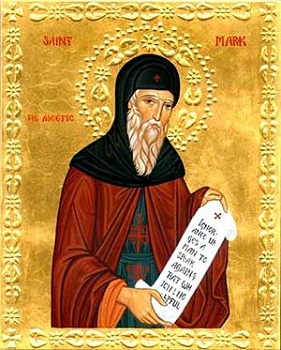
from the Letter of Saint Mark the Ascetic
to Nicholas the Solitary
This, my son, is how you should begin your life according to God. You should continually and unceasingly call to mind all the blessings which God in His love has bestowed upon you in the past, and still bestows for the salvation of your soul. You must not let forgetfulness of evil or laziness make you grow unmindful of these many and great blessings, and so pass the rest of your life uselessly and ungratefully. For this kind of continual recollection, pricking the heart like a spur, moves it constantly to confession and humility, to thanksgiving with a contrite soul, and to all forms of sincere effort, repaying God through its virtue and holiness. In this way the heart meditates constantly and conscientiously on the words from the Psalms; 'What shall I give to the Lord in return for all His benefits towards me?' (Ps. 116:12).
Thus the soul recalls the blessings of God's love which it has received from the moment it came into existence: how it has often been delivered from dangers; how in spite of having often fallen by its own free choice into great evils and sins, it was not justly given up to destruction and death at the hands of the spirits of deception; and how God with long-suffering overlooked its offences and protected it, awaiting its return. It also recalls that although through the passions it had become the willing servant of hostile and malicious spirits, He sustained it, guarding it and in all ways providing for it; and finally that He guided it with a clear sign to the path of salvation, and inspired it with the love of the ascetic life. So He gave it the strength gladly to abandon the world and all the deceitfulness of worldly pleasure, adorning it with the angelic habit of the monastic order, and providing for it to be received by holy men in an organized brotherhood.
Can any man consciously call these things to mind and not be moved always to contrition of heart? Having so many pledges from past blessings, will he not always have firm hope, in spite of the fact that he himself has so far done nothing good? He will say to himself: 'Though I have done nothing good and have committed many sins before Him, living in uncleanness of the flesh and indulging in many other vices, yet He did not deal with me according to my sins, or reward me according to my iniquities (cf. Ps. 103:10), but gave me all these gifts of grace for my salvation. If, then, from now onwards I give myself completely to His service, living in all purity and acquiring the virtues, how many holy and spiritual gifts will He not grant me, strengthening me in every good work, guiding and leading me aright.' If a man always thinks in this way and does not forget God's blessings, he encourages and urges himself on to the practice of every virtue and of every righteous work, always ready, always eager to do the will of God.
Therefore, my dear son, since through the grace of Christ you possess natural understanding, continue always to occupy your mind with such meditation. Do not let yourself be overcome by destructive forgetfulness or by the laziness which paralyzes the intellect and turns it away from life; do not allow ignorance, the cause of all evils, to darken your thinking; do not be lured by the corrosive vice of negligence; do not be seduced by sensual pleasure or defeated by gluttony; do not let your intellect be taken prisoner by lust through assenting to sexual thoughts, defiling yourself inwardly; do not be overcome by the anger which causes you to hate your brother and for some pathetic reason to inflict and suffer pain, leading you to store up malicious thoughts against your neighbor and to turn away from pure prayer. Anger enslaves the intellect, and makes you regard your brother with bestial cruelty; it fetters the conscience with uncontrolled impulses of the flesh, and surrenders you for a time to be chastised by the evil spirits to whom you have yielded.
Eventually your intellect, at a loss where to turn, is overwhelmed by dejection and laziness and forfeits all its spiritual progress. Then in deep humility it sets out once more on the path of salvation. Laboring much in prayer and all-night vigils, it uproots the causes of evil within itself through humility and confession before God and our neighbor. In this way it begins to regain the state of watchfulness and, illumined with divine grace and understanding of the Gospels, it perceives that no one can become a true Christian unless he gives himself up completely to the cross in a spirit of humility and self-denial, and makes himself lower than all, letting himself be trampled underfoot, insulted, despised, wronged, ridiculed and mocked; and all this he must endure joyfully for the Lord's sake, not claiming for himself in return any human advantages: glory, honor or praise, or the pleasures of food, drink or clothes.
Such are the contests and such the prizes that lie before us. How long, then, shall we mock ourselves by pretending to be devout, serving the Lord with hypocrisy, being thought one thing by men but clearly seen to be quite different by Him who knows our secrets? Other people regard us as saintly, but we are still savage. Although we have indeed an outward form of godliness, we do not possess its power before God (cf. 2 Tim. 3:5). Other people regard us as virginal and chaste, but in the sight of Him who knows our secrets, we are inwardly defiled by our assent to thoughts of unchastity, and made filthy by the activity of the passions. In spite of this, thanks to our seeming asceticism, we attract men's praises and are bowled over and blinded in our intellect.
How long shall we continue in this manner, our intellect reduced to futility, failing to make the spirit of the Gospel our own, not knowing what it means to live according to our conscience, making no serious effort to keep it pure?
Lacking real knowledge, we still trust solely in the apparent righteousness of our outward way of life, and so lead ourselves astray, trying to please men, pursuing the glory, honor and praise which they offer. But the Judge who cannot be deceived will certainly come, and 'will bring to light the things now hidden in darkness, and reveal the purposes of hearts' (1 Cor. 4:5). He neither respects the wealthy nor pities the poor, but strips away the outward appearance and reveals the truth hidden within. In the presence of the angels and before His own Father, He crowns those who have truly pursued the spiritual way and lived according to their conscience; and in the presence of the heavenly Church of the saints and of all the celestial hosts, He exposes those who possessed merely an outward pretence of devotion, which they displayed to men, vainly relying on it and deceiving themselves; and He banishes them in shame to outer darkness. Such people are like the foolish virgins (cf. Matt. 25:1-12), who did indeed preserve their outer virginity, yet in spite of this were not admitted to the marriage-feast; they also had some oil in their vessels, that is, they possessed some virtues and external achievements and some gifts of grace, so that their lamps remained alight for a certain time. But because of negligence, ignorance and laziness they were not provident, and did not pay careful attention to the hidden swarm of passions energized within them by the evil spirits. Their thoughts were corrupted by these hostile energies, while they themselves assented to this demonic activity and shared in it. They were secretly enticed and overcome by malicious envy, by jealousy that hates everything good, by strife, quarrelling, hatred, anger, bitterness, rancor, hypocrisy, wrath, pride, self-esteem, love of popularity, self-satisfaction, avarice, listlessness, by sensual desire which provokes images of self-indulgence, by unbelief, irreverence, cowardice, dejection, contentiousness, sluggishness, sleep, presumption, self-justification, pomposity, boastfulness, insatiateness, profligacy, greed, by despair which is the most dangerous of all, and by the subtle workings of vice. Even the good acts which they performed and their life of chastity were all for the sake of being seen and praised by men; and though they had a share in some gifts of grace, this they sold to the spirits of self-esteem and popularity. Because of their involvement with the other passions, they mixed their virtues with sinful and worldly thoughts, so rendering them unacceptable and impure, like Cain's sacrifice (cf. Gen. 4:5). Thus they were deprived of the joy of the Bridegroom and shut out from the heavenly bridal chamber.
Pondering, assessing and testing all this, let us realize our situation and correct our way of life while we still have time for repentance and conversion. Let us perform our good actions with purity, so that they are really good and not mixed with worldly thoughts; otherwise they will be rejected, like a blemished sacrifice, because of our irreverence, negligence and want of real knowledge. Let us be careful not to waste our days, lest we undergo all the effort of the life of virginity - practicing self-control, keeping vigil, fasting, showing hospitality - only to find at the end that, because of the passions we have mentioned, our apparent righteousness, like the blemished sacrifice, proves unacceptable to the heavenly Priest, Christ our God.
Therefore, my son, he who wishes to take up the cross and follow Christ must first acquire spiritual knowledge and understanding through constantly examining his thoughts, showing the utmost concern for his salvation, and seeking God with all his strength. He should question other servants of God who are of the same mind and engaged in the same ascetic struggle, so that he does not travel in the dark without a light, not knowing how or where to walk. For the man who goes his own way, traveling without understanding of the Gospels and without any guidance, often stumbles and falls into many pits and snares of the devil; he frequently goes astray and exposes himself to many dangers, not knowing where he is going. For many have endured great ascetic labors, much hardship and toil for God's sake; but because they relied on their own judgment, lacked discrimination, and failed to accept help from their neighbor, their many efforts proved useless and vain.

Saints from East and West
Saints whose feasts are celebrated this month
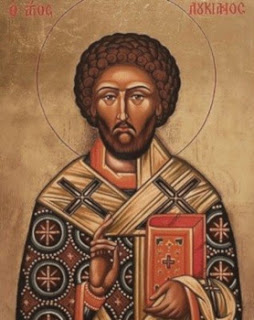
October 15 (Byzantine) - Saint Lucian of Antioch
The Monk-Martyr Lucian, Presbyter of Antioch, was born in the Syrian city of Samosata.
At twelve years of age he was left orphaned. Lucian distributed his possessions to the poor, and went to the city of Edessa to the confessor Makarios, under the guidance of whom he diligently read Holy Scripture and learned the ascetic life. For his pious and zealous spreading of Christianity amongst the Jews and pagans, Lucian was made presbyter.
At Antioch Saint Lucian opened a school, where there gathered many students whom he instructed in book wisdom. Saint Lucian occupied himself with teaching work, and he corrected the text of Holy Scripture, having been corrupted by copyists and heretics. (The entire Greek text of the Bible corrected by him was hidden away in a wall during the time of his confessor's deed, and it was found during the time of Saint Constantine the Great).
During the persecution of Diocletian, Saint Lucian was arrested, having been informed on by heretics, and he was dispatched to prison in Nicomedia, where over the course of nine years he encouraged Christians together with him in the confessor's deed, urging them not to fear tortures and death.
Saint Lucian died in prison from many terrible tortures and hunger. Before death, wanting to partake of the Holy Mysteries of Christ on the feast of Theophany, the hieromartyr, bound by chains to a box, was compelled to offer the Bloodless Sacrifice upon his chest, and all the Christians situated there in prison communed.
The body of the holy martyr was thrown into the sea, but after thirty days dolphins brought it to shore. Believers with reverence buried the body of the much-suffering Saint Lucian.

October 12 - Saint Ethelburga, Abbess of Barking
Ethelburga is said to have been born in the seventh century at Stallington in Lindsey, and she was the sister of Saint Erconwald, of whom it is said they were "bound together by a common love, one in heart and one in soul." Fired doubtless by the example of her brother, Saint Ethelburga determined to become a nun, and nothing could shake her resolution, for the world loses all its influence upon a mind which is wholly taken up with the great truths of faith and eternal salvation. Erconwald, before he became bishop of London, founded a monastery at Chertsey and another for both monks and nuns at Barking in Essex. Over this he set Ethelburga as abbess, and as she and her sisters were quite inexperienced, Saint Hildelitha was fetched from a French abbey to train her. We are told there was somewhat of a competition in austerity between the two saints, and Ethelburga, when the rule of the house was entrusted to her, by her example and spirit sweetly led on all the other nuns in the path of virtue and Christian perfection. "She behaved in all respects as became the sister of such a brother, living according to the rule, devoutly and orderly, providing for those under her, as was also manifested by heavenly miracles," of which Saint Bede relates several.
When an epidemic carried off some of the monks they were buried in the ground adjoining the church, and a discussion arose among the nuns as to where they should be buried when their time came: in the same part of the churchyard or another part. They could come to no decision, till one morning after Matins they were praying by the graves of the dead brothers, when suddenly a great light fell first upon them and then upon another side of the church; which light they understood "was intended to show the place in which their bodies were to rest and await the day of resurrection."
Saint Bede tells a touching story of a little boy of three years old, who was being brought up in the monastery and who died calling for one of the nuns, Edith, who shortly followed him; and of another nun who, dying at midnight, asked for the candle to be put out, exclaiming, "I know you think I am mad, but I am not. I see this room so filled with light that your candle there looks dark to me." And when they left it, she said, "Very well; let it burn. But it is not my light, for my light will come to me at daybreak." And at the dawn she died.
Saint Ethelburga's approaching end was foreseen in a vision by a nun called Theorigitha, who for nine years had been an invalid; and Ethelburga's life "is known to have been such that no person who knew her ought to question but that the heavenly kingdom was opened to her directly she left this world," says Bede. Three years later Theorigitha herself was dying, and had lost the use of her tongue. Suddenly she spoke and said, "Your coming is a great joy to me. You are welcome," and began to talk with an invisible person about how much longer she had to live. The bystanders asked whom she was talking to, and were told, "With my most dear mother, Ethelburga." The feast of Saint Ethelburga is to this day solemnly observed in the diocese of Brentwood.


Books to feed your faith!
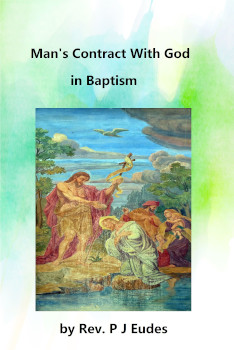
Man's Contract With God in Baptism
$9.95
This work is by Saint John Eudes, but translated prior to his canonization. Saint John Eudes begins: “How often have we been obliged to witness, in the every-day occurrences of human life, scenes which should call forth tears of blood, in beholding the many persons who, after having become by Baptism the children of God, the members of Jesus Christ and the living temples of the Holy Ghost, yet live rather as infidels and pagans than as true Christians. In truth, do we not behold men live, as if neither faith, nor reason, made any impression upon them, who, wholly occupied with the world and its vanities, seek nothing. beyond the gratification of their own passions, and who, allowing themselves to be entirely carried away by evil, have no more respect for God than pagans? If these persons perform any act of religion, it is only in compliance with the family routine, or following the habits acquired in early youth, while they are strangers to the spirit of true piety.” Let us consider this: “The name of contract is given to any agreement entered into by two or more persons, in which the parties contracting incur mutual obligations. This clearly shows that a contract has been entered into by the most Blessed Trinity and you in Baptism; since You have incurred many obligations towards the Blessed Trinity, and the Blessed Trinity has also obliged itself in regard to you. What is the nature of this contract? It is a reciprocal contract of gifts, the highest and most entire that can" enter into the heart of man to conceive;" for in making it you are obliged to give yourself entirely and forever to God; you have renounced all things to be united to Him, and for Him, and God on his part has given himself entirely to you. The Father, the Son, and the Holy Ghost, come to you and take up their abode in your soul, in order to confer honors and benefits on you. They enrich you with spiritual treasures to render you worthy of their three divine Persons.” We have entered a solemn contract with Almighty God. Let us learn our obligations in this holy contract and live up to them.
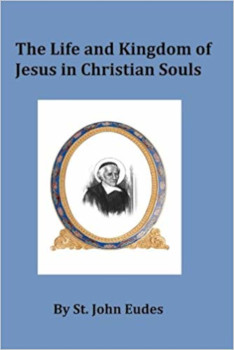
The Life and Kingdom of Jesus in Christian Souls
$17.95
According to the Roman Breviary, Saint John Eudes is the author of devotion to both the Sacred Heart of Jesus and the Immaculate Heart of Mary. His two works on these two devotions are classics. However, he is also a master to the spiritual life; an unknown master. Many are familiar with the works of Saint Bonaventure, Saint Alphonsus Ligouri and Saint Louis de Montfort to name just three of the masters of the spiritual life. And yet, Saint John Eudes has a lot to contribute. Let us consider this from Saint John Eudes in this excellent work: What truth can there be in the claim that we are Christians and adore a crucified God, a God agonizing and dying upon a Cross, a God who for love of us gives up so noble and excellent life, a God Who sacrifices Himself for us every day, before our eyes upon our altars for our salvation, if we are not ready to sacrifice to Him all that we hold dearest in the world, and even life itself, which in any case belongs to Him by all rights? Surely we are not Christians if we are not in these dispositions. Therefore I say, and this will immediately be clear to anyone who gives a little thought to the truths I have outlined, that all Christians ought to be martyrs, if not in actual fact, at least in intention and in will. So true is this, that if they are not martyrs of Jesus Christ, they will be martyrs of Satan. Choose whichever of the two you love more. If you live under the tyranny of sin, you will be a martyr to your self-love and your passions, and consequently a martyr to the devil. But if you desire to be a martyr of Jesus Christ, you must strive to live in the spirit of martyrdom. What is the spirit of martyrdom? It is a spirit that had five excellent attributes: 1.it is the spirit of strength and constancy which fears only God and sin, and cannot be shaken or overthrown, either by promises or threats, by persuasion or violence. 2.It is the spirit of deepest humility, which feels only horror for the vainglory and publicity of the world, and loves contempt and humiliations. 3.It is the spirit of self-mistrust and of most firm confidence in Jesus Christ our Lord, our Strength, in whom all things can be done. 4.If is the spirit of perfect detachment from the world and everything that is in the world. Those who are to sacrifice their lives to God must also sacrifice to Him all else besides. 5.It is the spirit of most burning love for our Lord Jesus Christ, who leads those animated by this spirit to do all and suffer all for love of Him, who dies and suffered all for them. It so inflames them that, for love of Him, they consider mortification and suffering to be a paradise of joys, to be sought and desired while they avoid and detest the pleasures of this world as much as they would hell itself. This is the spirit of martyrdom,. Implore, O Lord, who is the King of Martyrs, to fill you with this spirit. Pray to the Queen of martyrs, and all the martyrs, too, that they may obtain this spirit for you from the Son of God, by their holy prayers. Cultivate a particular devotion to the saintly martyrs. Make a point, also, of praying for all those who will have to suffer martyrdom, in order that God may grant them the spirit and grace of martyrdom. Pray especially for those who will have to suffer the persecution of antichrist at the end of the world, for it will be the most cruel and horrible of all persecutions. Finally, strive to develop within yourself, by imitation, a perfect image of the lives of the holy martyrs and, what is more, the life of the King and the Queen of martyrs, Jesus and Mary, so that they may make you worthy to resemble them in death.

Rosary Novenas to Our Lady: 54 Day Rosary Novena
$4.00
This devotion, which the author has called the 'Rosary Novenas to Our Lady,' is of comparatively recent origin. In an apparition of Our Lady of Pompeii, which occurred in 1884 at Naples, in the house of Commander Agrelli, the heavenly Mother deigned to make known the manner in which she desires to be invoked.For thirteen months Fortuna Agrelli, the daughter of the Commander, had endured dreadful sufferings and torturous cramps; she had been given up by the most celebrated physicians. On February 16, 1884, the afflicted girl and her relatives commenced a novena of Rosaries. The Queen of the Holy Rosary favored her with an apparition on March 3rd. Mary, sitting upon a high throne, surrounded by luminous figures, held the divine Child on her lap, and in her hand a Rosary. The Virgin Mother and the holy Infant were clad in goldembroidered garments. They were accompanied by St. Dominic and St. Catherine of Siena. The throne was profusely decorated with flowers; the beauty of Our Lady was marvelous.Mary looked upon the sufferer with maternal tenderness, and the patient saluted her with the words: 'Queen of the Holy Rosary, be gracious to me; restore me to health! I have already prayed to thee in a novena, O Mary, but have not yet experienced thy aid. I am so anxious to be cured!''Child,' responded the Blessed Virgin, thou hast invoked me by various titles and hast always obtained favors from me. Now, since thou hast called me by that title so pleasing to me, 'Queen of the Holy Rosary,' I can no longer refuse the favor thou dost petition; for this name is most precious and dear to me. Make three novenas, and thou shalt obtain all.'Once more the Queen of the Holy Rosary appeared to her and said, 'Whoever desires to obtain favors from me should make three novenas of the prayers of the Rosary, and three novenas in thanksgiving.'“This miracle of the Rosary made a very deep impression on Pope Leo XIII, and greatly contributed to the fact that in so many circular letters he urged all Christians to love the Rosary and say it fervently.”The Novena consists of five decades of the Rosary each day for twenty seven days in petition; then immediately five decades each day for twenty seven days in thanksgiving, whether or not the request has been granted.The meditations vary from day to day. On the first day meditate on the Joyful Mysteries: on the second day the Sorrowful Mysteries: on the third day the Glorious Mysteries: on the fourth day meditate again on the Joyful Mysteries; and so on throughout the fifty four days.A laborious Novena, but a Novena of Love. You who are sincere will not find it too difficult, if you really wish to obtain your request. Should you not obtain the favor you seek, be assured that the Rosary Queen, who knows what each one stands most in need of, has heard your prayer. You will not have prayed in vain. No prayer ever went unheard. And Our Blessed Lady has never been known to fail.Look upon each Hail Mary as a rare and beautiful rose which you lay at Mary's feet. These spiritual roses, bound in a wreath with Spiritual Communions, will be a most pleasing and acceptable gift to her, and will bring down upon you special graces.If you would reach the innermost recesses of her heart, lavishly bedeck your wreath with spiritual diamonds holy communions. Then her joy will be unbounded, and she will open wide the channel of her choicest graces to you.
For More Good Traditional Catholic Books:


Jud's Pumpkin Bread

The classic you've been asking for! The bread actually tastes even better the day after it is baked.
Ingredients
1 (15 ounce) can pumpkin puree
4 eggs
1 cup vegetable oil
2/3 cup water
3 cups white sugar
3 1/2 cups all-purpose flour
2 teaspoons baking soda
1 1/2 teaspoons salt
1 teaspoon ground cinnamon
1 teaspoon ground nutmeg
1/2 teaspoon ground cloves
1/4 teaspoon ground ginger
Directions
Preheat oven to 350 degrees F (175 degrees C). Grease and flour three 7x3 inch loaf pans.
In a large bowl, mix together pumpkin puree, eggs, oil, water and sugar until well blended. In a separate bowl, whisk together the flour, baking soda, salt, cinnamon, nutmeg, cloves and ginger. Stir the dry ingredients into the pumpkin mixture until just blended. Pour into the prepared pans.
Bake for about 50 minutes in the preheated oven. Loaves are done when toothpick inserted in center comes out clean.
Pamela's Turkey Tetrazzini

Comfort food for the fall season!Ingredients:
1/2 cup butter
1/2 cup all-purpose flour
3 cups chicken broth
2 cups milk
1 2/3 cups grated Parmesan cheese
4 cups chopped cooked turkey
Directions
Preheat oven to 350 degrees F (175 degrees C). Lightly grease a baking dish.
Bring a large pot of lightly salted water to a boil. Add spaghetti, and cook for 8 to 10 minutes or until al dente. Drain, and place in the prepared baking dish.
Melt butter in a medium saucepan over medium heat. Stir in flour. Mix in chicken broth and milk. Cook and stir until the mixture comes to a boil. Stir in about 1 1/3 cups Parmesan cheese, and remove from heat.
Mix chicken broth mixture and turkey with spaghetti. Top with remaining cheese. Bake 1 hour in the preheated oven, until surface is lightly browned.

Video sermons and instructions: Timeless timely truths for living the Faith
Christ the King 2014
Video Sermon: Keep Your Word
The Dedication of Saint Michael 2019
Sacred Moments: To God Be the Glory

Encouragement for Today
Therefore encourage one another and build one another up.... I Thessalonians 5:11
We believe...
that through our assorted podcasts, audio downloads and devotional blogs, you will find an assorted Treasure Chest of...
Sermons
Devotionals
Scripture Studies
Catechism Lessons
Daily Blogs
...that will be a help in your faithful walk with the Lord.
LEARN MORE AT THE ENCOURAGEMENT FOR TODAY WEBSITE: https://www.encouragementfortoday.com
While the earth remaineth, seedtime and harvest, cold and heat, summer and winter, night and day, shall not cease. Genesis 8:22
Climate scientists in Britain have been in the forefront of so-called expert opinion on global warming. At every opportunity, therefore, there are items of news in the British media about how weather in the UK has become more extreme in recent years.
One recent report in the New Scientist magazine claimed that in the last 10 years high temperatures in summer have been getting higher, while low temperatures in winter are not so high. Apparently, the hottest day in each of the years 2008 – 2017 were 0.8°C hotter than the hottest days in each year from 1961 – 1990. In addition, the report claims that “the chilliest extremes of the year are not quite as biting as they were in the past, with the lowest temperature of the year 1.7°C milder in the last decade than it was in the three decades up to 1990.”
It is understandable that official figures are not yet available for 2018. It is my understanding that the hottest British day of 2018 was also the hottest day on record. However, when I was visiting the UK in February 2018, the country was going through a severe cold snap.
Notice also that no comments are made about temperatures between 1990 and 2008. This is because global temperatures – including those in Britain – fell during those years, but this article fails to report that!
God’s perspective on global warming is this: “While the earth remaineth, seed time and harvest, cold and heat, summer and winter, night and day, shall not cease.”

Catechism Catch-Up
Introduction to the Ten Commandments
Most of us are aware of the Ten Commandments that God gave Moses. It is a small part of the Mosaic covenant or what is also called the Sinaitic Covenant (named after the biblical Mount Sinai). This covenant is sometimes also referred to as the Law of Moses or Mosaic Law.
You may not know all of the ten commandments. It is good to know all of them. The Ten Commandments is only a small part of the Mosaic Covenant. I want to point something out to you in those Ten Commandments which you may have not noticed up until now. We will see a little bit of the reason why God gave The Law, even though He knew that The Law under the Mosaic covenant could never lead anyone to becoming spiritual or to live a godly life. In fact, in Hebrews 8:7, you will see very clearly that the Mosaic Covenant, the 'First Covenant', the Law, was faulty.
For if that former, the first covenant, had been faultless, there should not indeed a place have been sought for a second. (Hebrews 8:7)
Did God give something faulty? Did He make a mistake? - He certainly didn't; He knows the end from the beginning. He gave it with a purpose, for our help; for us to see our need. The Law was given to expose sins. (Romans 7:7-25) We could also say that The Law was given by God to test man - to see how many people would be satisfied with an external righteousness that brought the honour of men, and how many would seek God for that inner purity which alone pleases God.
You remember when Jesus was speaking to the Pharisees, He told them, "You are people, who just clean the outside of the cup, but God sees your hearts and He wants the inside of the cup cleansed. You people will do all the right things externally so that people are impressed, but God sees deep within; He is looking for inner purity of motive." We can say that the Pharisees were like Adam covered with fig leaves, and you know, there is curse upon it.
He that hideth his sins, shall not prosper (Proverbs 28:13)
That is why you find that Jesus was in constant conflict with the Pharisees.
The Pharisees, who kept the letter of the law down to the last detail, whose doctrines were so correct that we read that Jesus told even His disciples to follow the teachings of the Pharisees (Matthew 23:2-3). The reason why He said that was because whatever the Pharisees said was right. The only thing, He said, is that they don't do like the Pharisees lived; don't follow their example in your life, because they teach things they don't practice. So, there was nothing wrong with the doctrine of the Pharisees.
There was another group in Jesus' time called the Sadducees who had wrong doctrines. Jesus never told His disciples to follow their teachings, because they didn't believe in angels or Spirit or resurrection. In fact, they were very earthly minded. They didn't think much about future life at all. Their doctrine was wrong. But the Pharisees were the people whose doctrines were right.
A person can have all his doctrines right - his doctrines may be thoroughly Catholic and yet he may be religious; He may be only having a doctrine which is external.
Now think of the Ten Commandments; God said, "You shouldn't have any other gods, you must not take My name in vain, you must keep the Sabbath day holy. You must honour your father and mother, you must not murder, you must not commit adultery, you must not steal, you must not bear false witness." Now these are eight of the Ten Commandments. It is possible for any person, without the help of the Holy Spirit, to keep those eight commandments. The proof of it is that many people in the Old Testament kept those eight commandments without the help of the Holy Spirit.
They did not have the Holy Spirit living within the individual in the Old Testament times and yet, Paul could say, "I have conversed (that is lived, done my duty) with all good conscience before God until this present day." (Acts 23:1). The rich young ruler, when Jesus pointed out these commandments to him, said, "all these things I have observed from my youth." (Mark 10:20). It was possible for a God-fearing person to keep all these commandments without the help of the Holy Spirit, just by his own strength. It is possible for any man of any religion, Judaism, Islam, etc; to keep these eight commandments without any help from God, because man has certain strength to lead an externally moral life. If you don't lead an externally moral life, nobody is going to accept your religion. People expect religious people to be, at least, moral externally!
But, when we come to the ninth and tenth commandment, they did not deal with the external; they dealt with something inward. The commandment was, 'You shall not lust or covet or strongly desire'- all these three words mean the same. Unfortunately lust has got an evil connotation in people's minds. But all it means is strong desire, like it says in Galatians 5:17, "The Holy Spirit lusts against the flesh." What does that mean? The Holy Spirit doesn't do any evil. He has got a strong desire against (as opposed to) the flesh. And the flesh has got a strong desire against the Holy Spirit.
It is the same word used in Exodus 20: 17 in the ninth and tenth Commandment -"Thou shalt not covet thy neighbour's house: neither shalt thou desire his wife, nor his servant, nor his handmaid, nor his ox, nor his ass, nor anything that is his." This means the same as, 'You shall not lust for your neighbour's house or lust for your neighbour's wife.' It means the same as, 'You shall not have a strong desire for your neighbour's house or for your neighbour's wife or you shall not have a strong desire to get your neighbour's servant and wish that that servant who works in your neighbour's house could be your servant, because maybe she is such a faithful servant. You shall not desire your neighbour's business, or his donkey, or anything that is your neighbour's.
The ninth and tenth commandment was inward. The thing is there is no way by which anybody could find out whether you kept it or not. It was impossible.
Now Paul was a very, very honest person. He tells us that, 'according to the justice that is in the law, he was conversing (living) without blame.' (Philippians 3:6). He had kept the law blamelessly. What does it mean? Does it mean he kept all Ten Commandments? - He certainly didn't; He kept only eight. But that is all that was required. Nobody could keep the ninth and tenth commandment. Nobody could say I have never lusted after anything; I have never lusted for my neighbour's wife or my neighbour's daughter and remember every woman in the world is either your neighbour's wife or your neighbour's daughter, everyone in the world. You can never say that you have never desired what belongs to somebody else.
There is not a soul in this world who can say that, not even the apostle Paul. And He tells us that very honestly, "What shall we say, then? Is the law sin? God forbid." He continued, "I do not know sin, but by the law" (Romans 7:7). Then he mentions the ninth and tenth commandments, not the first eight, because he kept the first eight. He says, when it came to the ninth and tenth Commandment, which said, 'You shall not covet, you shall not lust, you shall not have a strong desire for anything that is yours neighbour's,' he says, "for I had not known concupiscence (lust), if the law did not say: Thou shalt not covet." (Romans 7:7). He was honest. He said, 'I thought I was pleasing God till this commandment showed me the corruption of sin in my life. I saw that I was dead spiritually in God's eyes, because I found every kind of lust in me.' He says, 'Every kind of coveting, every kind of strong desire' or the old english word....concupiscence (Romans 7:7).
Why did God give such a commandment if He knew that nobody could keep it without the help of the Holy Spirit?
Now here is the answer: God gave it to see how many people would be honest in admitting that they come short in this area. Do you know; the first step to being spiritual is honesty? God doesn't ask you to be holy first; none of us can be holy. Again, He doesn't ask us to be loving or humble or anything first, because all these things take time.
There is one thing you can be today, that is the first step to true spirituality, and that is honest. Paul was honest. He said, 'It is true, I find every type of covetousness in my heart. I am a sinner.' He admits, 'Such a sinner that I thought I was alive, but I was actually dead, I was dead in sin.' A man who kept every single external commandment acknowledges that he is thoroughly dead in sin, because he discovered every type of lust in his heart.
How do you find it in your heart? You just gotta be honest. If you are honest, God will lead you further. But if you are dishonest and pretend that you don't have any such desires and that you are so clean and upright like the Pharisees pretended, then Jesus will say to you, sarcastically, like He said to the Pharisees, "I did not come for the righteous people, I came for the sinners. I came to call sinners to repentance," and he will pass by you altogether. And you will miss the Lord completely, like the Pharisees missed him.
Why did they miss the Lord? Why did the Lord leave them alone? He says, "You people are healthy. I came for sick people; only sick people need a doctor. Why do you healthy people need me?" (see Matthew 9) You think they were healthy? - Far from healthy. Pharisees were the sickest people in Israel. Why did Jesus say, "You people are healthy?" He was being sarcastic. He was trying to show them their hypocrisy. He was showing them that He would not go to help those who are not honest.
You see, how easy it is to come to the Lord. You just gotta be honest about the sin in your heart and say, 'Lord, there is every type of lust in me.' Because Paul was honest, you know what happened? He discovered how the Holy Spirit's power could help him keep even the ninth and tenth commandment; How the Holy Spirit's power could deliver him from lusting within his heart.
The blood of Jesus would cleanse his past failure and the Holy Spirit's power would deliver him. He says, "For the law of the spirit of life, in Christ Jesus, hath delivered me from the law of sin and of death." (Romans 8:2). Do you want that experience? Do you want to come into a life where the Law of the Spirit delivers you from this slavery to lust in your heart? Be honest. Tell the Lord that you have come short, that you have failed, that you have sinned in your heart. Then through the sacrament of confession ask Him to forgive you and cleanse you in His blood and say, 'Lord, I never want to be dishonest again.' Ask Him to fill you with His Holy Spirit and give you power within and you can be pure.
Act of Contrition
"O my God, I am heartily sorry for having offended Thee, and I detest all my sins, because of thy just punishment, but most of all because they offend Thee, my God , who art all good and deserving of all my love. I firmly resolve with the help of thy grace to sin no more and avoid the near occasion of sin. Amen."
Living Catholic:
Is Rejecting Myself The Same As Rejecting God?
We Are God’s Workmanship: Learning To Cherish God’s Design
Just as artists express their innermost values and thoughts through art, God expresses Himself through His creation, which includes you!
Scripture states that believers are God’s workmanship.
For we are his workmanship, created in Christ Jesus unto good works, which God hath ordained and prepared that we should walk in them. (Ephesians 2:10.)
Each unchangeable part of your life is like a precise word selected by a poet or a specific color prepared by an artist. God designed the unique details of your life to demonstrate a particular aspect of His grace and glory.
Suppose that an artist’s canvas had a will of its own and could say, “I dislike these colors. I will reject them.” In rejecting the colors, the canvas rejects the message and purpose of the artist.
In the same way, if you reject the unchangeable features that God designed for your life, you reject His work and the message and purpose He wants to accomplish in and through you. Angry outbursts of self-rejection such as “I hate I look” or “I hate life” are bitter reactions toward God and His design.
Self-acceptance receives God’s design and seeks to understand the purpose for each feature God selected. Some unchangeables, such as the Apostle Paul’s thorn in the flesh, may be unpleasant.
And lest the greatness of the revelations should exalt me, there was given me a thorn of my flesh, an messenger of Satan, to buffet me. For which thing thrice I besought the Lord, that it might depart from me. And he said to me: My grace is sufficient for thee; for my power and strength is made perfect in infirmity. Gladly therefore will I glory in my infirmities, that the power of Christ may dwell in me. For which cause I please myself in my infirmities, in reproaches, in necessities, in persecutions, in distresses, for Christ. For when I am weak, then am I strong and powerful. (II Corinthians 12:7–10.)
However, self-acceptance allows you to be at peace with God, to accept your unchangeables, and to be excited about what God can accomplish in and through them.
To Learn More Principles For Life Go To: Resources: Principles of Life

Pray for the Holy Father! Pray with the Holy Father!
-
Your prayers are asked this month and every month for the intentions of the Holy Father, Pope Michael.
-
Keep us in your prayers as we begin our new Podcast Ministry, a new way to reach out in the missionary work of the Church! We ask for prayers for our other activities world wide. We have made good contacts in the Philippines and Japan and ask prayers that these contacts will bear much fruit for the salvation of souls.
-
Be sure to keep St. Helen Catholic Mission in your prayers. Why not go on over to the site now and see what they have to offer and how you might be able to help!
-
Also we ask you to keep in prayer for our Mission: St. Ignatius of Antioch in Arkansas City, Kansas.
-
Your prayers are asked for Father Francis Dominic as he embarks upon the important work entrusted to him within the Church.
-
Pray for those outside the Church and those who do not know God, that they may see the light of grace and be led safely home to the refuge of the Holy Catholic Church.
-
As always, we also ask that you pray for yourself! Never forget your own state of soul. God is calling you to His service in His love. We know that our Lord can count on you to answer.
-
We are all praying especially for you, too. May you correspond with every grace of God!
-
In what other needs or intentions may we pray for you? Let us know!
-
Let us remember that the Church runs on prayer. Without your prayers, God will not work in hearts and souls to bring them to a knowledge of the truth. (I Timothy 2:4)



To Donate by Mail:
Our address is
Vatican in Exile
829 NE Chester
Topeka, Kansas 66616
Make Checks payable to:
Vatican in Exile










 Follow
Follow


